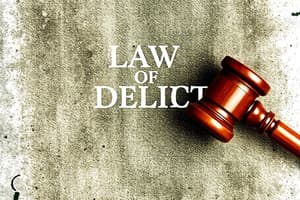Podcast
Questions and Answers
What is the source of Scots Law that includes Acts of the Scottish Parliament and EU law?
What is the source of Scots Law that includes Acts of the Scottish Parliament and EU law?
- Case Law
- Common Law
- Roman Law
- Legislation (correct)
What is the supreme civil court in Scotland?
What is the supreme civil court in Scotland?
- Scottish Government
- High Court of Justiciary
- Lord Advocate
- Court of Session (correct)
What is unique about the constitution of Scots Law?
What is unique about the constitution of Scots Law?
- It is unwritten (correct)
- It is dual
- It is codified
- It is mixed
What is the principle that a third party can acquire a right or interest in a contract?
What is the principle that a third party can acquire a right or interest in a contract?
What area of Scots Law deals with civil wrongs and liabilities?
What area of Scots Law deals with civil wrongs and liabilities?
What is the role of the Lord Advocate?
What is the role of the Lord Advocate?
What area of Scots Law concerns the ownership and possession of land and other property?
What area of Scots Law concerns the ownership and possession of land and other property?
What is the principle that agreements must be kept and parties are bound by their contractual obligations?
What is the principle that agreements must be kept and parties are bound by their contractual obligations?
What is the supreme criminal court in Scotland?
What is the supreme criminal court in Scotland?
What is the characteristic of Scots Law that combines civil law and common law elements?
What is the characteristic of Scots Law that combines civil law and common law elements?
Flashcards are hidden until you start studying
Study Notes
Sources of Scots Law
- Legislation: Acts of the Scottish Parliament, Acts of the UK Parliament, and European Union law (until Brexit)
- Case Law: Decisions of the Scottish courts, including the Court of Session and the High Court of Justiciary
- Common Law: Principles and rules developed through custom and judicial decisions
- Roman Law: Influence of Roman law on Scots law, particularly in the areas of contract and property
Characteristics of Scots Law
- Mixed Legal System: Combination of civil law and common law elements
- Unwritten Constitution: No single, codified constitution; instead, a collection of documents and laws that make up the constitution
- Dual System: Separate systems for civil and criminal law
Institutions of Scots Law
- Court of Session: The supreme civil court in Scotland, with appellate and original jurisdiction
- High Court of Justiciary: The supreme criminal court in Scotland, with appellate and original jurisdiction
- Scottish Government: Responsible for the administration of justice in Scotland
- Lord Advocate: The chief legal officer of the Scottish Government, responsible for prosecuting crimes and advising the government on legal matters
Areas of Scots Law
- Contract Law: Governed by the principles of Roman law, with a focus on the exchange of promises and the enforcement of obligations
- Delict: The Scots law equivalent of tort law, dealing with civil wrongs and liabilities
- Property Law: Concerned with the ownership and possession of land and other property
- Criminal Law: Deals with the prosecution and punishment of crimes, with a focus on the protection of the public and the maintenance of order
Key Concepts
- Jus Quaesitum Tertio: A third party can acquire a right or interest in a contract, even if they are not a party to the contract
- ** Damnum Injuria Datum**: A person who has suffered a wrong is entitled to compensation
- ** Pacta Sunt Servanda**: Agreements must be kept, and parties are bound by their contractual obligations
Sources of Scots Law
- Acts of the Scottish Parliament, Acts of the UK Parliament, and European Union law (until Brexit) form the Legislation source of Scots Law.
- Case Law is based on the decisions of the Scottish courts, including the Court of Session and the High Court of Justiciary.
- Common Law principles and rules are developed through custom and judicial decisions.
- Roman Law influences Scots law, particularly in the areas of contract and property.
Characteristics of Scots Law
- Scots Law is a Mixed Legal System, combining civil law and common law elements.
- The Unwritten Constitution is a collection of documents and laws that make up the constitution.
- Scots Law has a Dual System, with separate systems for civil and criminal law.
Institutions of Scots Law
- The Court of Session is the supreme civil court in Scotland, with appellate and original jurisdiction.
- The High Court of Justiciary is the supreme criminal court in Scotland, with appellate and original jurisdiction.
- The Scottish Government is responsible for the administration of justice in Scotland.
- The Lord Advocate is the chief legal officer of the Scottish Government, responsible for prosecuting crimes and advising the government on legal matters.
Areas of Scots Law
- Contract Law is governed by the principles of Roman law, focusing on the exchange of promises and the enforcement of obligations.
- Delict is the Scots law equivalent of tort law, dealing with civil wrongs and liabilities.
- Property Law is concerned with the ownership and possession of land and other property.
- Criminal Law deals with the prosecution and punishment of crimes, focusing on the protection of the public and the maintenance of order.
Key Concepts
- Jus Quaesitum Tertio allows a third party to acquire a right or interest in a contract, even if they are not a party to the contract.
- Damnum Injuria Datum entitles a person who has suffered a wrong to compensation.
- Pacta Sunt Servanda binds parties to their contractual obligations, requiring them to keep their agreements.
Studying That Suits You
Use AI to generate personalized quizzes and flashcards to suit your learning preferences.




